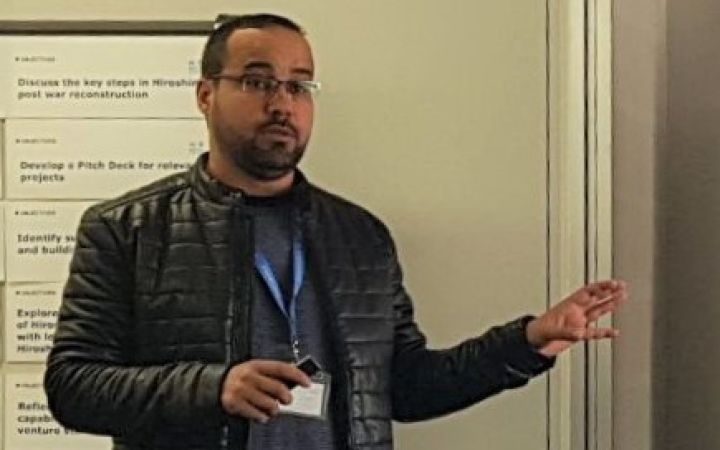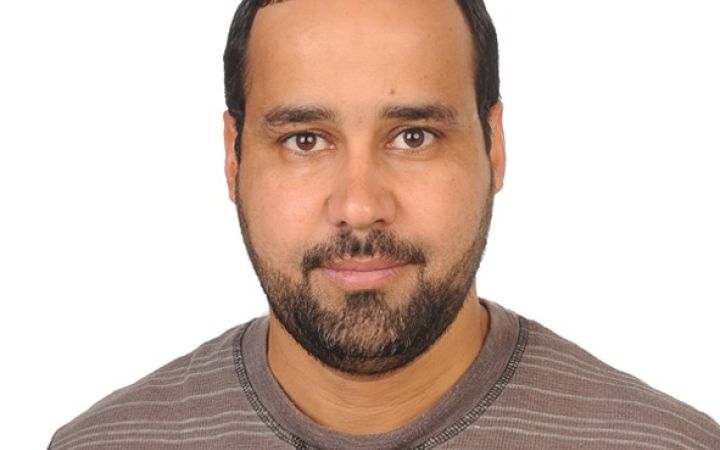HUSSEIN NAEEM HASAN NASER
What does it take to rebuild a nation shattered by war? More than just bricks and mortar, reestablishing the socio-economic foundations is a vital part of the process, one that is particularly important for restoring people’s sense of opportunity, dignity and hope. However, accomplishing such thing depends largely on the nation’s capacity to retain talents that will contribute to efforts towards enabling the state to be fully functional again. Hussein Naeem Hasan Naser is, without a doubt, one of these rare talents!
DEVELOPING ENTREPRENEURSHIP SKILLS IN IRAQ
Born in Southern Iraq, Hussein moved to Baghdad to study, where he ended up living for 15 years. His interest in robotics led him to pursue a bachelor’s degree in Mechatronics Engineering at the University of Baghdad. After completing his undergraduate studies, Hussein became one of the 10,000 students to join the Iraq Education Initiative, launched by Iraq’s Prime Minster Noori Al Malki with the purpose of sending promising professionals to study in the best accredited universities worldwide. The educational programme, designed to fill the gap between Iraq’s education and that of the world, aimed at further developing teaching staff, improving curricula through the introduction of modern teaching methods and fostering knowledge exchange and creating a scientific atmosphere.
Hussein went on to work towards a master’s degree in Mechatronics Engineering at the Michigan State University, USA, where he researched the ‘Design, Development, and Modeling of a Wirelessly Charged Robotic Fish’, a challenging topic in the field of robotics that adds to the complexity in waterproofing mechanical devices. After finishing his master’s degree, Hussein went back to Iraq and was welcomed with great job opportunities. He is currently Manager of Training and Technical Support Unit in the Quality Assurance Department and Lecturer in the Biomedical Engineering Department at the University of Thi-Qar and thus accumulates a lot of responsibilities. “I provide technical support and training to employees in our universities, teach robotics design and I also supervise students working on their undergraduate thesis”, he explains.
Despite the promising career opportunities, Hussein was feeling uneased by the harsh post-conflict reality in his home country. “When I came back, I saw a lot of social problems in Iraq that were consequences of the war, such as poverty and violence. So, I had the idea of building a towing service mobile app to facilitate users’ access to the service anywhere in Iraq, helping minimize the risk of people being exposed to robbery or any potential threatening situations”.
While he was building the system, Hussein knew he would need to gain practical knowledge and skills on entrepreneurship to turn his idea into a successful business solution. It was when he came across the ‘2019 UNITAR Hiroshima Transforming the Future: Empowering Social Entrepreneurs and Youth Leaders for Iraq’, a 12-month fellowship programme designed to support young entrepreneurs to initiate, develop and lead wealth-creating enterprises.
Entrepreneurship while solving social issues
“During the training I learned a lot about business. I learned to negotiate, solve problems and conduct market research. I also learned about costumer services, customer behaviour and the value of costumers’ feedback for improving a product. But, more importantly, I learned how to build solutions that are not only commercially profitable but also socially relevant, that are designed considering local needs”, he says adding he also gain leadership skills useful for his professional goals.
Hussein applied all his newly gained knowledge to the development of the Towing Service App, which uses GPS system to determine the location of the user and provide a list of towing service owners arranged according to the nearest provider, so users can receive assistance as soon as possible. To make things even better, the mobile tool works online and offline, especially on Iraq’s outside roads, and is available in both Arabic and English.
By supporting junior-mid level professionals like Hussein in the development of their entrepreneurial capacity, UNITAR expects to encourage creative minds to initiate other start-ups and foster innovative solutions that will contribute to local and regional economic growth. Hussein is exactly on this path and is already planning to turn more ideas into actions. “I love being independent and working on my own business, so I want to continue dedicating time to my projects and eventually be able to work full time on them. I want to create more solutions that will help generate job opportunities and rebuild a better Iraq”.



